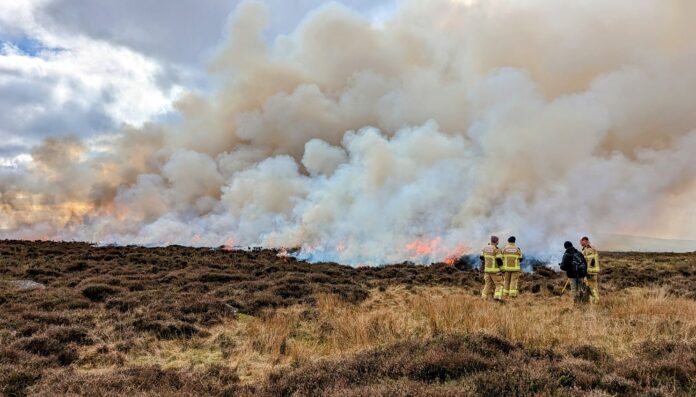In early March, members of the Pembrokeshire Community Fire Safety team and Haverfordwest Station visited Carningli Mountain to oversee preparation works and a control burn, in readiness for the summer and as part of responsible land management.
During their first visit of the week, they saw firebreaks being cut by a remote-controlled ‘iCutter’ flail, which can cut grass, weeds, shrubs and branches. Working in conjunction with the Carningli Graziers Association and rangers from Pembrokeshire Coast National Park, areas were being prepared for prescribed burning.
On their second visit, the Graziers Association were conducting a controlled burn and were joined and assisted by Natural Resources Wales (NRW), with the prescribed area lit in a controlled manner and supervised throughout.
Every year, fire is responsible for the destruction of thousands of hectares of countryside, open space, and wildlife habitats. From the beginning of January to mid-March alone, Mid and West Wales Fire and Rescue Service (MAWWFRS) has attended 84 grass fires.
Temperature records were shattered during 2022, with parts of Wales breaking the 40°C threshold for the first time in recorded history during a series of heatwaves. As is often the case with hot weather, many people visited Wales’s world-renowned coastline, however this did not come without issues. MAWWFRS attended hundreds of grassfires during this period and sadly, over half of these were reported as being deliberate.
In July last year, the popular coastal resort of Newgale was turned black as fire tore through the dry undergrowth twice, destroying 11 hectares of countryside and numerous wildlife habitats. While extensive damage made it difficult to determine a cause, the most likely source of ignition seems to have been a discarded barbecue.
August proved to be an even busier month for MAWWFRS, with a wildlife incident near Whitesands caused by a discarded glass bottle, as well as yet another major grassfire in Newgale – this time burning 60 hectares and requiring the assistance of crews from as far afield as Brecon and Llandrindod Wells.
Although the landscapes and wildlife are expected to fully recover over time, these incidents form part of a more worrying pattern of climate change, where changing conditions are aiding the spread of fires and on a far more frequent basis.
Many wildfires are preventable and there some simple steps that can be taken to avoid another summer blighted by them, these include:
- Never use barbecues or light fires in national parks, including beaches. Apart from the fire risk, the hot coals and sharp edges of discarded barbecues pose a hazard to wildlife and people.
- Extinguish cigarettes and other smoking material properly.
- Clear away bottles, glasses, and any broken glass to avoid them magnifying the sun and starting a fire.
- Explain to children the dangers of playing with and lighting fires.
MAWWFRS has recently reformed Operation Dawns Glaw, a multi-agency taskforce of specialists from key agencies across Wales who are committed to reduce, and where possible eliminate, the impact of grass fires across Wales. More information on #DawnsGlaw can be found here.
In 2022 the fire services across Wales attended 3,269 grassfire incidents – this was an increase of 62% on the previous year, with deliberate grass fires increasing by 1,542 (47%) to 2,263.
Starting a deliberate fire is a criminal offence. You can report a deliberate fire anonymously by calling Cymru/Wales CrimeStoppers on 0800 555111. In an emergency, always call 999.
Help keep news FREE for our readers
Supporting your local community newspaper/online news outlet is crucial now more than ever. If you believe in independent journalism, then consider making a valuable contribution by making a one-time or monthly donation. We operate in rural areas where providing unbiased news can be challenging. Read More About Supporting The West Wales Chronicle

























